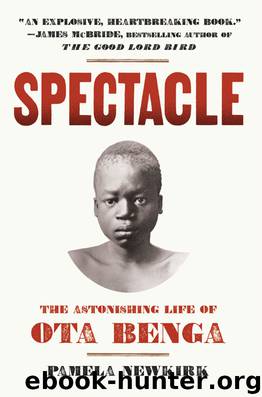Spectacle: The Astonishing Life of Ota Benga by Pamela Newkirk

Author:Pamela Newkirk [Newkirk, Pamela]
Language: eng
Format: epub
Publisher: HarperCollins
Published: 2015-06-02T04:00:00+00:00
EIGHTEEN
LEOPOLD’S LOBBY
The expedition not only augmented Starr’s already impressive credentials and personal fortune, but also would provide him with a prominent platform for defending Leopold’s rule. On his return, Starr emerged as one of Leopold’s most trenchant defenders. In a series of fifteen articles published in the Chicago Tribune he would lend his eminence as a scholar to dismiss the king’s critics.1 Under headlines like “The Truth About the Kongo as Told by an Unbiased American Educator,” he noted how the expedition had afforded him an objective close-up look at conditions in the interior that had been widely condemned in newspapers and magazines.
Before embarking on his expedition, Starr claimed, he read the literature of the Congo Reform Association, and he went to the Congo expecting to witness “all kinds of horrors.”
“I supposed that mutilations, cruelties and atrocities of the most frightful kinds would everywhere present themselves. I expected to find a people everywhere suffering, mourning, and in unhappiness,” he wrote.
Instead, he found a Negro population “far happier than I had dreamed it possible.” In the Congo, he insisted, “Life is easy. Wants are few.”
He did report that he had repeatedly witnessed state-imposed floggings, chain gangs, and forced labor, and he essentially corroborated what Sheppard, Morel, and Casement had reported. But, employing a sort of tu quoque argument, Starr said the same conditions could be found in the U.S. South.
“Flogging, chain-gangs, prison, mutilation, heavy taxation, hostages, depopulation, all these I saw,” he divulged, confirming Sheppard’s claim that chain gangs could be found at every state post. He described Africans employed in “all sorts of work” joined together by rings around their necks. But contrary to reports, he said the rings were of a “light iron” not exceeding two pounds. He said it was a “very mild form of punishment” that did not arouse his sympathy: “To grieve over the weight carried in the form of chain and ring is simply ridiculous.”
He also downplayed the widely practiced floggings with the chicotte, a stiff whip made of rhinoceros hide that Leopold’s critics described as an especially cruel form of torture. Starr trivialized the practice as “a rather mild and simple punishment” that “hurt but little.” As for reports of slavery, he said it still flourished but was “difficult to deal with” and “scarcely worth the candle.”
Starr also explained away Roger Casement’s report corroborating accounts of widespread mutilations. He said the mutilations were a traditional native custom and not limited to the Congo Free State, or to Africans. He noted that the British force had recently decapitated a hostile chief. He casually remarked that “most of the difficulty” with Congo natives stemmed from the demands on them to gather rubber. “The native hates the forest; he dislikes to gather rubber,” Starr matter-of-factly remarked.
Starr also failed to understand the fuss over taking hostages, particularly the practice of taking men from their villages to collect rubber. He noted that the great explorer Henry Morton Stanley had used female hostages to provide food supplies, without provoking a similar outcry.
Download
This site does not store any files on its server. We only index and link to content provided by other sites. Please contact the content providers to delete copyright contents if any and email us, we'll remove relevant links or contents immediately.
| Africa | Americas |
| Arctic & Antarctica | Asia |
| Australia & Oceania | Europe |
| Middle East | Russia |
| United States | World |
| Ancient Civilizations | Military |
| Historical Study & Educational Resources |
Cat's cradle by Kurt Vonnegut(15352)
Pimp by Iceberg Slim(14506)
4 3 2 1: A Novel by Paul Auster(12391)
Underground: A Human History of the Worlds Beneath Our Feet by Will Hunt(12097)
The Radium Girls by Kate Moore(12028)
Wiseguy by Nicholas Pileggi(5783)
The Fire Next Time by James Baldwin(5442)
Perfect Rhythm by Jae(5403)
American History Stories, Volume III (Yesterday's Classics) by Pratt Mara L(5307)
Paper Towns by Green John(5189)
Pale Blue Dot by Carl Sagan(5007)
A Higher Loyalty: Truth, Lies, and Leadership by James Comey(4960)
The Mayflower and the Pilgrims' New World by Nathaniel Philbrick(4502)
The Doomsday Machine by Daniel Ellsberg(4490)
Killers of the Flower Moon: The Osage Murders and the Birth of the FBI by David Grann(4447)
The Sympathizer by Viet Thanh Nguyen(4390)
Too Much and Not the Mood by Durga Chew-Bose(4348)
The Borden Murders by Sarah Miller(4325)
Sticky Fingers by Joe Hagan(4198)
